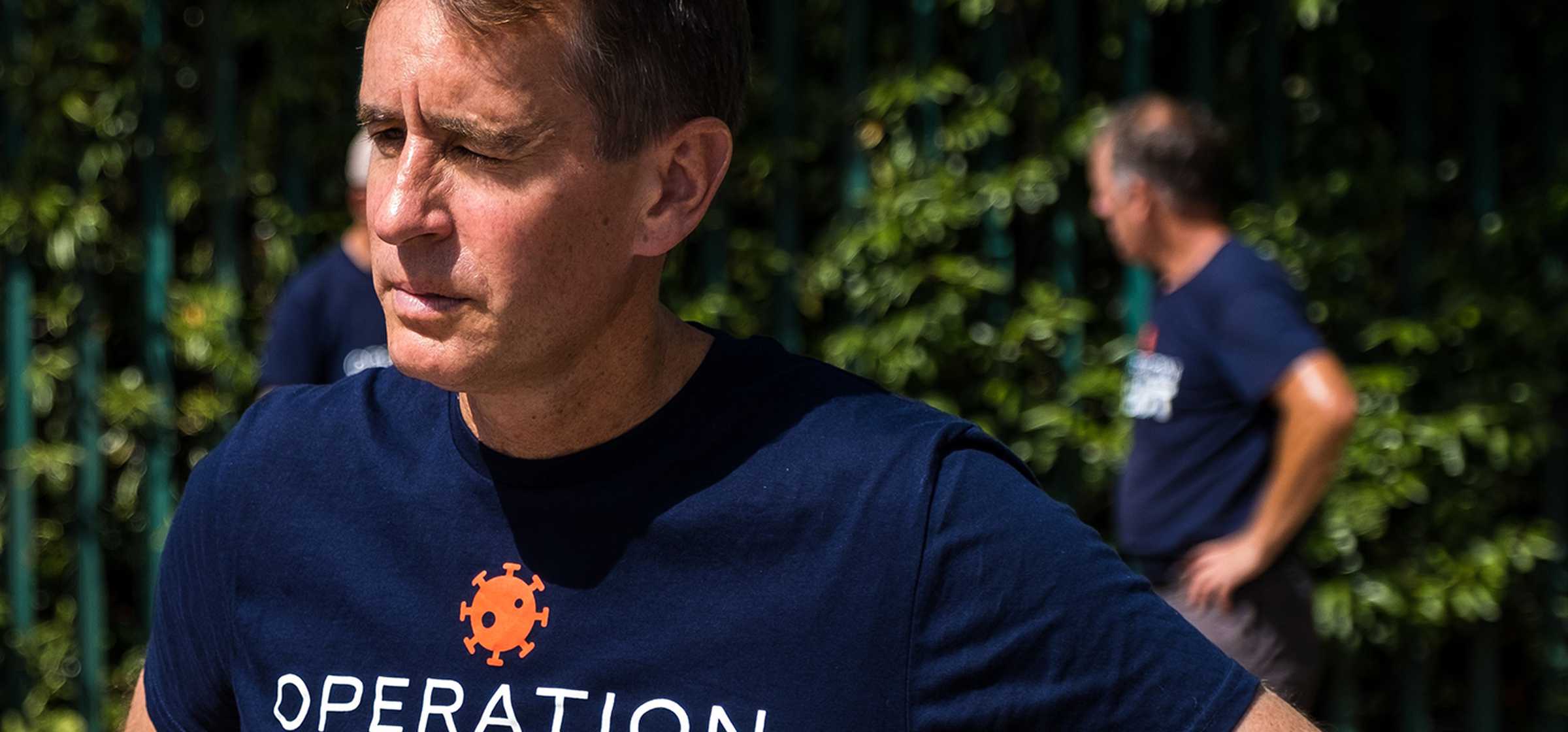Why RE:ACT’s military approach has been so effective in responding to Covid-19

Posted by Ben Lampard 03rd December 2020 Opinion
Estimated Reading Time: 6 mins
After 250 days (and counting) on emergency response to Covid-19, RE:ACT Director of Humanitarian Operations, Ben Lampard, highlights the significance of RE:ACT’s military operating model, and why it’s enabled RE:ACT to deliver so much impact.
As I look back on 250 long days on deployment in response to Covid-19, I am immensely proud of the volume and diversity of tasks that RE:ACT has delivered all over the country. Some of those tasks have been extremely demanding, in particular the mortuary assistance we gave to overwhelmed hospitals during the worst weeks of the pandemic. But our commitment and resolve to help those most in need have never diminished.
For such a small and relatively unknown charity – operating out of the extremely modest surroundings of a WW2 RAF accommodation block in rural Wiltshire, with unreliable internet connection and barely a mobile phone signal – to have had so much impact is astonishing.
Our response to Covid-19 has of course been very different to our responses to natural disasters overseas but the fundamentals have been the same. Those fundamentals are broadly what we term our military approach – our preparation, our planning, our processes and our people; all of them designed to be highly agile, adaptable and resilient to uncertainty and sudden change.
The impact that we have delivered is proof of how effective that approach is, and why an organisation like ours was needed in a time like this.
Speed of action
The Covid-19 pandemic has presented an extraordinary challenge and created massive uncertainty. RE:ACT’s strength is in our ability to respond to exactly these kinds of scenarios.
There are many amazing charities and organisations that do incredible work, but they’re unable to react as fast to sudden change because they’re involved with ‘business as usual’ tasks. RE:ACT, however, specialises in VUCA (volatile, uncertain, complex, ambiguous) environments. We wait for crises to happen and spring into action. It’s the environment we operate in that determines our approach and the people we recruit – and the reason why we’re so heavily influenced by military skills and methodology.
Whenever an emergency, crisis or disaster strikes, our job is to rapidly mobilise and deploy to fill critical gaps and relieve pressure
As our name suggests, RE:ACT is about immediate action. Whenever an emergency, crisis or disaster strikes, our job is to rapidly mobilise and deploy to fill critical gaps and relieve pressure during the early response phase, before larger humanitarian actors and charities are able to arrive with aid. By reaching the worst affected communities as fast as we can and going where we’re most needed, we save lives and alleviate suffering, buying time for those bigger players to mobilise the larger resources for relief and recovery efforts to be sustained over a longer period.
In order to have such a quick capability, RE:ACT needs to be incredibly adaptable and agile. That doesn’t apply just to our Responders but to our whole organisation, our infrastructure, our methods, and our culture. We work very deliberately on joining up those areas to ensure that at every level people are trusted and empowered to make critical decisions so we can operate at speed. Trust is a central tenet of Mission Command, the command philosophy of the British Army that has been honed over many years. Define the mission, establish the operational parameters, and trust people to do their jobs.
Trust enables speed. With any crisis or disaster, you have to move at the speed of events before they escalate out of your control.
Trust enables speed. With any crisis or disaster, you have to move at the speed of events before they escalate out of your control. You don’t have time to gradually adjust or feed information up the line to wait for decisions from the top – lives depend on how quickly you act. The ability to be thrown into the centre of the action, to restore order and be trusted to solve problems methodically and effectively, are all qualities that the military emphasises in its operational training and deployments, and they’re the same qualities RE:ACT emphasises too.
Communication and collaboration
Nothing we do is in isolation, so without communication and collaboration, we wouldn’t achieve anything.
When RE:ACT launched its emergency Covid-19 response back in March, we took a big risk. There was a considerable financial risk but also a reputational one. We were a relatively unknown entity in the UK, our focus having previously been on international disasters, but we launched our response in the belief that we could help make a difference.
We had to quickly prove ourselves useful to operational partners. This is where we relied on our military connections, becoming a conduit between the military response and civil authorities. We spoke in military language which gave us credibility, but we had a humanitarian face which gave us trust. We used our unique position to bring together different parties from across the military, voluntary and government spectrum, connecting dots from strategic to tactical to operational level, and helping to bring together those organisations as part of a collaborative national response.
you have to be able to understand local needs to respond to them effectively.
Importantly, that collaboration was also at a community level. As we have seen throughout this pandemic, not every area is affected in the same way, and what is a critical need in one region won’t necessarily be the case elsewhere, so you have to be able to understand local needs to respond to them effectively.
In international disasters, we work quickly to get people on the ground to build situational awareness. When we deployed in response to Covid in March, we did the same thing, rapidly mobilising RE:ACT Responders to act as Regional Liaison Officers throughout the UK, embedding them with local response networks to acquire and distribute valuable information. Our immediate priority was to build a clearer understanding – in military terminology, what we call a common operating picture. This enabled RE:ACT and other organisations to identify and respond to critical tasks as quickly and effectively as possible.
The success of that model has led us to rolling out a new Regional Representative laydown, which will be an ongoing part of RE:ACT’s role in UK resilience, beyond Covid.
Flexibility and dependability
RE:ACT provides direct action, rather than aid. We work on understanding what is most needed and how to get it there. That flexible approach gives us the ability to act as a force multiplier for other organisations when they come under severe pressure. They know they can rely on us to bolster their ranks and ensure the needs of the most vulnerable continue to be met.
We have seen that flexibility in action throughout this response, working closely with organisations such as the NHS, VCS EP, FareShare and the military to plug critical gaps.
we rely on the combined expertise and experience of people who have spent a significant amount of their lives training for and deploying to volatile and unpredictable environments
To be effective in what we do, we rely on the combined expertise and experience of people who have spent a significant amount of their lives training for and deploying to volatile and unpredictable environments, solving complex problems with insufficient information, limited resources and little time.
As well as a large cohort of military veterans, we also have many exceptional people from blue light services and other backgrounds who possess the qualities needed. What matters is their suitability to fit how we operate.
Throughout Covid, we’ve taken on tasks that were new to us but where there was a clear need we could help to meet. We’re now focused on supporting large-scale testing and vaccinations, as well as helping to tackle ongoing issues of food poverty and insecurity, which is having a significant impact on many families and communities in the UK.
As ever, we don’t know what the next crisis will be, but we have every faith in our approach and our ability to respond to whatever needs emerge.
Help us continue our life-saving work at home and overseas. Please give what you can.
